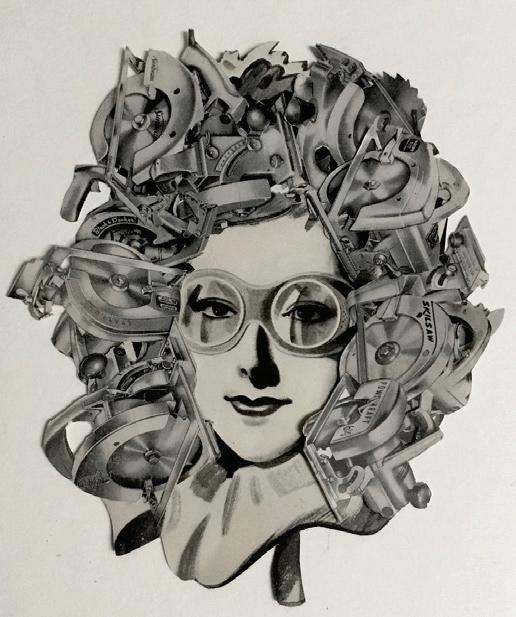
5 minute read
FEATURE The New Normal
FEATURE The New Normal of Grieving
By Lindsay WiLson
Matt Brewer Bethany Funeral hoMe
photo by Sam Foo
When Matt Brewer, manager and funeral director at Bethany Funeral Home in La Vista, thinks back to the early days of the pandemic, the uncertainty is what stands out.
As other workers hunkered down for what would become a year of working from home, the last responders at Bethany doubled down on their personal protective equipment and put their health on the line to continue providing vital end-of-life services to the community.
“People are dying, and they don’t have anywhere else to turn,” Brewer said.
When fall and winter hit, the directors at Bethany were handling about double their normal caseload. Bethany is a small funeral home, with only three funeral directors on staff.
“Generally, we see about 15 to 20 [calls] per month, and at one point we were at about 45,” Brewer said. Seventy five percent of these calls were COVID-related.
With the caseload rise came an increase in exposure risk for last responders like Brewer. If a deceased person had COVID, the likelihood that their family members have been exposed is high. Even with safety practices in place, last responders continue to be exposed to the virus every day. This takes a toll.
“It’s emotionally, physically and spiritually taxing on us,” Brewer said.
While last responders are also vital, public support has focused heavily on first responders.
“It is tough, because there is this big support for the medical community, and rightly so. I do support that. But the last responders are sort of forgotten about,” Brewer said.
Part of this absence of public support, Brewer said, stems from a failure in our overall reckoning with the deadliness of COVID.
“The sad part about the state of our society or country: It became so politicized,” Brewer said. “There were a lot of people on social media and the news kind of denying the significance of what was going on. And it’s hard to hear people talk about whether or not they felt this thing was real when we’re going to work every day and actually dealing with the victims of it.”
Brewer said the semantics of whether the actual cause of death was explicitly COVID don’t matter in the wake of the staggering loss of life to the virus.
“When somebody says ‘Well, they probably didn’t really die of COVID, it probably was something else,’ that doesn’t help the family. They still are suffering the loss,” Brewer said.
According to the CDC, by early March, more than 500,000 people had died from COVID-19
in the United States. Every one of those deaths was attended to by a last responder like Matt Brewer.
The pandemic is reshaping not only the work done by funeral directors and other last responders, it is changing the nature of how we deal with grief. At this point the 10-person limit on funeral services is a thing of the past, but the service has changed possibly forever. Where families formerly held services and had long lines to receive hugs and support from loved ones, many are forgoing the service altogether in order to keep everyone safe.
When guidelines first came out encouraging people to avoid large gatherings and socially distance, some families planned to simply delay funeral services for lost loved ones until they could hold a traditional funeral.
As we enter the second year of the pandemic, it’s becoming clear the traditional funeral may not be possible for a long time.
“As we see it going on and on further down the road from the actual death, I think a lot of families are giving up on having those,” Brewer said.
While Bethany Funeral Home is back to full capacity for services, arranging a funeral for a death that occurred early in the pandemic is proving an impossible task for some families. They have grieved the loss, now they are grieving the second loss of the funeral they pictured to honor their lost loved one. Even if restrictions are lifting, the virus still lurks despite masks and social distancing.
“It’s sad that they’re not able to give that person a good sendoff,” Brewer said.
For families choosing to hold services, Bethany offers streaming options so high-risk individuals can take part without the risk associated with gathering. In addition to masks, social distancing and sanitizing precautions, Bethany also offers private viewings and separate rooms so loved ones can partake in the service from a safer distance.
But Brewer said there’s no substitute for the loss of physical contact as a means of support.
“To be denied that when you need it most is heartbreaking, and I don’t know how people are getting through it,” he said.
Brewer is optimistic about the future but remains cautious.
Brewer said the vaccine rollout offers hope for some return to normalcy. He was vaccinated early as part of a clinical trial, and he expects the rest of Bethany will get the vaccine as soon as possible.
There are other reasons to be hopeful, Brewer said. He believes people are becoming more compassionate and more understanding of loss and separation, as we have all experienced heavy losses in the months of quarantine. In addition, the new precautions and accessibility measures taken during the pandemic will continue to benefit families in the future.
In the meantime, Brewer is grateful to have a strong support system in his faith community. He is also thankful for a close sense of community among local funeral directors.
“It is stressful, but we do have each other to lean on,” he said.






